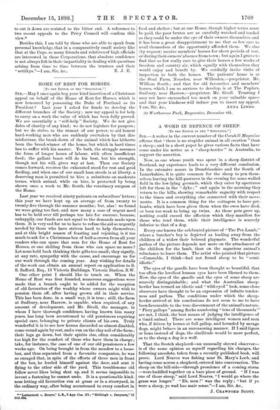A WORD IN DEFENCE OF SHEEP.
[To THE EDITOR OF THE " SPECTAT011."]
Sin—A writer in the current number of the Cornhill Magazine affirms that " there is no stupider animal in all creation " than a sheep ; and in a short paper he gives various facts that have come under his notice as a " sheep-herder " in Australia, to- support the assertion.
Now, as one whose youth was spent in a sheep district of Scotland, my experience leads to a very different conclusion.. In the extensive moors in Dumfriesshire and the South of Lanarkshire, it is quite common for the sheep to pen them- selves, leaving the hill-pastures in the evening for some walled field in the low-lying grounds, which they enter by apertures. left for them in the " dyke ; " and again in the morning they return to the hills, showing remarkable sagacity with respect to the times and everything else connected with their move- ments. It is a common thing for the cottagers to have pet- lambs, which have been given them when the ewes have died, or been too weak to bring up twins. As these pets grow up, nothing could exceed the affection which they manifest for- those who tend them, while their intelligence is scarcely inferior to that of a dog.
Every one knows the celebrated picture of " The Pet-Lamb," where a butcher's boy is depicted as leading away from the children of a widow their beloved playmate. The wonderful pathos of the picture depends not more on the attachment of the children for the lamb, than on the sagacious animal's reluctance to leave them. The artist who painted that picture —Constable, I think—had not found sheep to be " semi- idiotic."
The eyes of the gazelle have been thought so beautiful, that too often the loveliest human eyes have been likened to them.. Now, the eyes of the gazelle and the eyes of some sheep are scarcely distinguishable ; and what the Australian sheep- herder has termed an idiotic and "wild-eyed" look, some close- observers have thought to be an expression of infinite tender. ness and pathos. The conditions under which the sheep- herder arrived at his conclusions do not seem to me to have been favourable to the true discernment of the animal's nature. " Fiery gallops " among flocks numbering " tens of thousands are not, I think, the best means of judging the intelligence of a timid animal. There are some intelligent women and men who, if driven by horses at full gallop, and hounded by savage dogs, might behave in an unreasoning manner. If I said tigers. or lions instead of dogs, the similitude would be more perfect, as to the sheep a dog is a wolf.
That the Scotch shepherd—an unusually shrewd observer is of the same opinion as myself regarding his charges, the- following anecdote, taken from a recently published book, will. prove. Lord Neaves was fishing near St. Mary's Loch, and having come across a shepherd, entered into conversation. The sheep on the hill-side—through prescience of a coming storm —were huddled together on a bare piece of ground. " If I was one of those sheep," said Lord Neaves, "I would go where the grass was longer." " Eh, mon !" was the reply ; " but if ye were a sheep, ye wad hae mair sense."—I am, Sir, &c., J. CRAWFORD SCOTT.














































 Previous page
Previous page